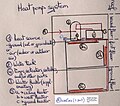Off-the-grid
The term off the grid or off-grid refers to living in a self-sufficient manner without reliance on one or more public utilities.
Off-grid homes are autonomous—i.e. do not rely on municipal water supply, sewer, natural gas, electrical power grid or similar utility services. A true "off the grid" house is able to operate completely independently of all traditional public utility services. The idea has proved to be of enduring interest to architects as well as environmentalists.[citation needed]
Electrical power can be generated on-site with renewable energy sources such as solar or wind, or with a generator and adequate fuel reserves.
On-site water sources can include a well, stream, or lake. Depending on the water source, this may include pumps or filtration.
On 12 April 2006, USA Today reported that there were "some 180,000 families living off-grid, a figure that has jumped 33% a year for a decade," and cited Richard Perez, publisher of Home Power magazine, as the source.[citation needed] Assuming the same rate of growth, there would be a quarter million off-grid households in the United States by late 2007. Because many third-world citizens have never had the chance to go on the grid, current estimates are that two billion people live off-grid worldwide.[citation needed]
Going off-grid can be done for altruistic reasons or to lower the environmental impact of living, as the typically limited amount of on-site renewable energy available is an incentive to reduce its use. It is often done to residential buildings only occasionally occupied, such as vacation cabins, to avoid high initial costs of traditional utility connections. Other persons choose to live in houses where the cost of outside utilities is prohibitive, or such a distance away as to be impractical. In his book "How to live off-grid" Nick Rosen lists seven reasons for going off-grid. The top two are saving money, and reducing the carbon footprint. Others include survivalism, preparing for the collapse of the oil economy and bringing life back to the countryside.
Primary infrastructure considerations for off the grid construction:[citation needed]
- Fresh water source
- Energy source
- Waste disposal
See also
References
Gallery
-
Complete DIY Wind generator system
-
A PV-solar system
-
Schematic of an active solar heating system
-
A HVAC heat pump system
-
Treatment ponds can be used for purifying water
-
Heat and cold storage may be combined with heat pumps for use in the domestic greenhouse or to heat the house itself





